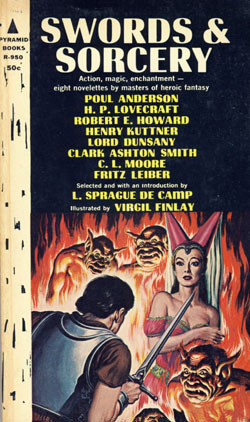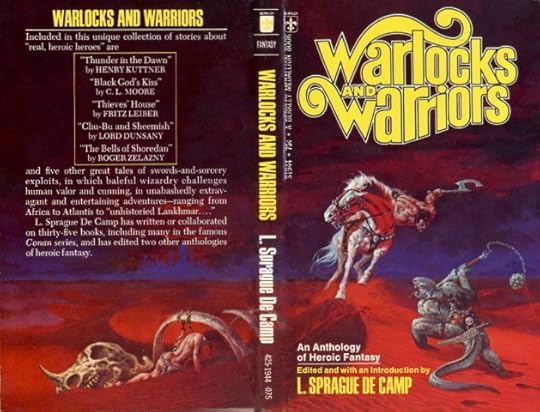Sword & Sorcery: "An earthier sort of fantasy" discussion
About Sword & Sorcery
>
A timeline: 700BC to 2004AD
date newest »
newest »
 newest »
newest »
 Hi Periklis -
Hi Periklis -Yes, I doubt if Leiber had any idea of what he was starting with that name for the form. I wondered if that letter, which I believe appeared in Amra in 1961 has ever been reprinted in its entirety? And when did my beloved ampersand first appear instead of the prosaic 'and'? My money's on the first de Camp anthology in 1963.
Phil.
Phil wrote: "Hi Periklis -
Yes, I doubt if Leiber had any idea of what he was starting with that name for the form. I wondered if that letter, which I believe appeared in Amra in 1961 has ever been reprinte..."
Thank you for your feedback!
Never thought about the ampersand/"&" versus the prosaic "and", before. I wonder if the ampersand is used for distinguishing tales, "good" from "bad" (or "ours" from "theirs"), much like SF vs Sci-fi or Trekker vs Trekkie.
I hope a full scan of Leiber's letter surfaces. There was an interesting blogpost by Michael Swanwick, where he mentions an aphorism by R.A. Lafferty along with Leiber's first definition of S&S on the fanzine, "Ancalagon" :
"Science Fiction is a collection of guerrilla bands each challenging the rights of the others to belong to the centrality. The band most challenged by the others is 'high fantasy', sometimes called 'Sword and Sorcery'. There is a lot of stylized sneering at 'S and S'."
BTW this must be the de Camp anthology you mentioned:

Yes, I doubt if Leiber had any idea of what he was starting with that name for the form. I wondered if that letter, which I believe appeared in Amra in 1961 has ever been reprinte..."
Thank you for your feedback!
Never thought about the ampersand/"&" versus the prosaic "and", before. I wonder if the ampersand is used for distinguishing tales, "good" from "bad" (or "ours" from "theirs"), much like SF vs Sci-fi or Trekker vs Trekkie.
I hope a full scan of Leiber's letter surfaces. There was an interesting blogpost by Michael Swanwick, where he mentions an aphorism by R.A. Lafferty along with Leiber's first definition of S&S on the fanzine, "Ancalagon" :
"Science Fiction is a collection of guerrilla bands each challenging the rights of the others to belong to the centrality. The band most challenged by the others is 'high fantasy', sometimes called 'Sword and Sorcery'. There is a lot of stylized sneering at 'S and S'."
BTW this must be the de Camp anthology you mentioned:

 Hi Periklis -
Hi Periklis -Those early de Camp anthology covers didn't do the form any favours in my opinion - but the final collection of the four, 'Warlocks and Warriors', has my favourite s-&-s image of all time, a wraparound cover by Steranko.
Phil.
Phil wrote: "Hi Periklis -
Those early de Camp anthology covers didn't do the form any favours in my opinion - but the final collection of the four, 'Warlocks and Warriors', has my favourite s-&-s image of al..."
Thank you for sharing this, it's really impressive!

As I wasn't aware of this anthology, I was surprised with the inclusion of H. G. Wells' story, The Valley of Spiders.
Those early de Camp anthology covers didn't do the form any favours in my opinion - but the final collection of the four, 'Warlocks and Warriors', has my favourite s-&-s image of al..."
Thank you for sharing this, it's really impressive!

As I wasn't aware of this anthology, I was surprised with the inclusion of H. G. Wells' story, The Valley of Spiders.
 Hi Periklis -
Hi Periklis -The Wells story does come a little out of left field, doesn't it. Makes sense to me in that the spider is, I believe, one of the classic s-&-s motifs. More on this another time.
Phil.
Authors mentioned in this topic
H.G. Wells (other topics)Michael Swanwick (other topics)





ca. 700-600 B.C.E.: "A copy of The Epic of Gilgamesh is archived in the Library of Asshurbanipal in Assyria. The story dates back to the second millennium B.C.E. Its tale of a mighty hero-king battling monsters and going on a quest to find the secret of immortality contains many elements essential to what will later be termed "sword-and-sorcery." One of the first surviving stories of civilization."
1929: "Publication in Weird Tales of Robert E. Howard's "The Shadow Kingdom," his first story featuring the Barbarian King Kull, and the first time Howard set a story in a completely fictional fantasy setting."
1961: "Fritz Leiber first suggests the use of the term "sword-and-sorcery" to Michael Moorcock as a way of distinguishing the particular sub-genre of fantasy in which they write."